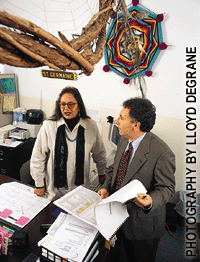Action
anthropologist Terry Straus works with the city's Native Americans
as they strive to preserve their heritage and determine their
future.
 About
five years ago,
Roxy Grignon heard someone calling her name from outside her Chicago
apartment. Looking down from her second-floor window, she saw
a young woman. When Grignon buzzed the woman up, she realized
that she was holding a baby. The mother told her how she was struggling
with drugs and had spent the night on the street. Grignon felt
she had to help, as both she and the mother shared a Native-American
heritage and had known each other previously on the Menominee
Indian Reservation in Wisconsin. With three grown daughters of
her own, Grignon became a licensed foster parent and has since
adopted the boy.
About
five years ago,
Roxy Grignon heard someone calling her name from outside her Chicago
apartment. Looking down from her second-floor window, she saw
a young woman. When Grignon buzzed the woman up, she realized
that she was holding a baby. The mother told her how she was struggling
with drugs and had spent the night on the street. Grignon felt
she had to help, as both she and the mother shared a Native-American
heritage and had known each other previously on the Menominee
Indian Reservation in Wisconsin. With three grown daughters of
her own, Grignon became a licensed foster parent and has since
adopted the boy.
 As
word spread, Grignon soon got more such pleas for help. Overwhelmed,
she began asking other Native Americans to serve as foster parents.
Then in 1997, the former entrepreneur and probation officer formed
the Native American Foster Parents Association (NAFPA), which
has since helped license 21 Native-American foster homes throughout
Illinois, with 59 licenses pending.
As
word spread, Grignon soon got more such pleas for help. Overwhelmed,
she began asking other Native Americans to serve as foster parents.
Then in 1997, the former entrepreneur and probation officer formed
the Native American Foster Parents Association (NAFPA), which
has since helped license 21 Native-American foster homes throughout
Illinois, with 59 licenses pending.
The
group has also designed a curriculum for social workers and juvenile-court
personnel on Native-American culture and the intent of the 1978
Indian Child Welfare Act, which sought to end decades of placing
Native-American children in non-Native-American homes. A recent
meeting with the Illinois Department of Children and Family Services
(DCFS) is expected to establish a protocol for linking the more
than 130 Native-American children in the state's foster-care system
with Native-American families. "This is important for the children's
culture and their identity," says Grignon, "and for the future
of our people."
Anthropologist
Anne Terry Sawyier Straus, AM'70, PhD'76, advises NAFPA on financial
and legal issues, helps it recruit Native Americans to serve as
foster parents, and advocates on its behalf. The group, says Straus,
a University of Chicago professorial lecturer, is an example of
the vibrancy and renewed activism of the city's Native Americans
at the end of the 20th century. "They are forcing the issue of
who should raise Indian children," she says, "and they are the
only group that has set about to educate social workers about
the law and to recruit foster parents. Their work shows how this
is an era of self-determination for Indian people."




![]()
 About
five years ago,
Roxy Grignon heard someone calling her name from outside her Chicago
apartment. Looking down from her second-floor window, she saw
a young woman. When Grignon buzzed the woman up, she realized
that she was holding a baby. The mother told her how she was struggling
with drugs and had spent the night on the street. Grignon felt
she had to help, as both she and the mother shared a Native-American
heritage and had known each other previously on the Menominee
Indian Reservation in Wisconsin. With three grown daughters of
her own, Grignon became a licensed foster parent and has since
adopted the boy.
About
five years ago,
Roxy Grignon heard someone calling her name from outside her Chicago
apartment. Looking down from her second-floor window, she saw
a young woman. When Grignon buzzed the woman up, she realized
that she was holding a baby. The mother told her how she was struggling
with drugs and had spent the night on the street. Grignon felt
she had to help, as both she and the mother shared a Native-American
heritage and had known each other previously on the Menominee
Indian Reservation in Wisconsin. With three grown daughters of
her own, Grignon became a licensed foster parent and has since
adopted the boy. 